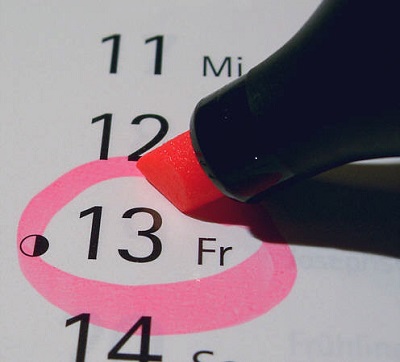Today is a bad day for sufferers of ‘paraskevidekatriaphobia’, who will be feeling excruciatingly anxious and counting down the minutes until they can relax again tomorrow.
That almost unpronounceable word is the scientific name for the fear of Friday the 13th – a recognised and very real psychological condition. The term was coined by psychotherapist Dr Donald Dossey, who reportedly told his patients that once they could pronounce it they were cured! It is made up of the Greek words ‘paraskevi’ (Friday), ‘dekatria’ (13) and ‘phobia’ (fear of).
 Simply being superstitious and a little wary of Friday the 13th is a far cry from genuinely suffering from paraskevidekatriaphobia, which leaves some people so paralysed with fear that they avoid their normal routines or even refuse to leave their home. Some literally refuse to get out of bed on Friday the 13th for fear that something terrible is about to befall them.
Simply being superstitious and a little wary of Friday the 13th is a far cry from genuinely suffering from paraskevidekatriaphobia, which leaves some people so paralysed with fear that they avoid their normal routines or even refuse to leave their home. Some literally refuse to get out of bed on Friday the 13th for fear that something terrible is about to befall them.
In America, the Stress Management Centre and Phobia Institute estimates that between 17 and 21 million Americans are affected by fear of this day to some degree, making it the most feared day and date combination in history. It is estimated that up to $900 million is lost in business each Friday the 13th in the USA, partly due to superstitious employees taking time off or just not showing up, but also due to an unwillingness to conduct potentially risky deals on a day perceived as unlucky.
There are no similar figures for the UK, but the perception of Friday the 13th as an unlucky day is ingrained in British culture. In reality, it is probably no more or less unlucky than any other day, but when things do go wrong on Friday the 13th the temptation is to blame it on the day and date, so that the long-held superstition becomes self-fulfilling.
In 1993 the British Medical Journal published a study which concluded there were more traffic-related incidents on the 13th than on any other typical Friday. A newer study from Holland – another nation which fears Friday the 13th – contradicts that finding. The Dutch Centre for Insurance Statistics found significantly fewer accidents and reports of fire and theft on Friday the 13th than on other Fridays. It concluded that people wary of a Friday the 13th mishap were either taking more care or just staying at home.
In Finland, the country’s annual ‘National Accident Day’ – an accident prevention initiative led by the Ministry of Social Affairs and Health – is always organised to fall on a Friday the 13th. Who says the Finns have no sense of humour!
The truth is you make your own luck, either by ignoring superstition surrounding Friday the 13th or, if you can’t ignore it, taking extra care in whatever you’re doing, or even doing nothing at all. But where does this superstition, prevalent across much of the world, come from in the first place?
Thirteen has long been considered an unlucky number in many cultures and, again, fear of the number alone is a recognised medical condition – ‘triskaidekaphobia’. Superstition about Friday the 13th being a particularly ill-fated day seems to have arisen in the Middle Ages in Western Europe, strongly linked to the spread of Christianity.
Christ’s last supper was held on the 13th day of the month with 13 people (Christ and his disciples) present on the night before his crucifixion on Good Friday. Another possible origin in more recent history is that Friday October 13th in 1307 marked the beginning of a violent purge of the Knights Templar, a wealthy and powerful Catholic military order which the Pope and his Cardinals saw as a threat to their authority.
On that day King Philip IV of France, manipulated by the Pope, ordered the arrest and torture of scores of Knights Templar. Many confessed under torture to trumped-up charges of heresy and were stripped of their lands and wealth, or even executed. Persecution of the Templars continued for several years, with Friday the 13th remembered as a notorious date.
Regardless of how the superstition came about, it is now firmly established in popular culture, reinforced in literature, comic books, video games and films, including a long-running franchise of American “Friday the 13th” horror films. If you’re superstitious about the date, just be extra careful today and then you can rest easy again… at least until Friday the 13th of December.
